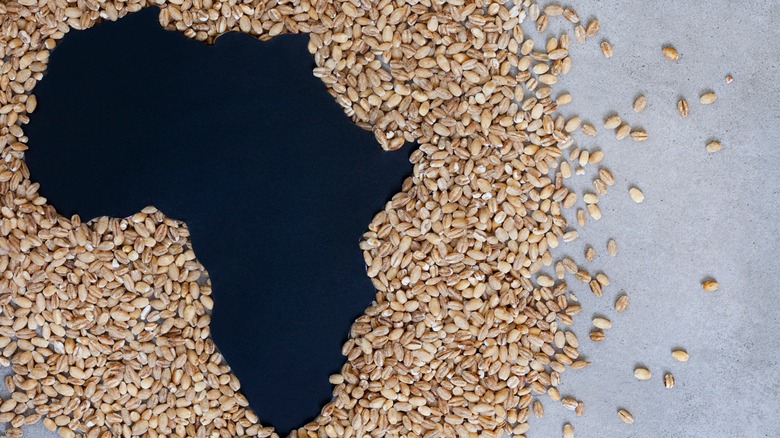G-20 Leader Warns The Food Crisis Could Be Worse Than Covid For Africa
At the height of the COVID-19 pandemic in Africa, more than 1,000 people were dying every day and more than 250,000 total deaths were reported as of July 15, 2022 (via Reuters). Now, Africa is facing the threat of hunger and famines as food prices still linger at some of their highest points in decades. Leaders like Senegalese Minister of Economy Amadou Hott say that unless action is taken soon, the coming food crisis will be worse for countries like his, and many others, than the COVID-19 pandemic ever was (via CNBC).
Much of the fear relating to the food crisis can be traced back to the ongoing war in Ukraine. Russia and Ukraine are both massive grain exporters that contribute roughly one third of the world's wheat imports (via CNBC). According to The Conversation, Russia contributed a third of Africa's wheat imports between 2018 and 2020, with Ukraine adding another 12%. The conflict between the two has not only inhibited their abilities to export the vital crop, it has also sent a wave of anxiety throughout the industries that make these imports possible.
There was some hope as a safe naval corridor was established, and Russia resumed exporting their own abundant wheat supplies. But Turkey quickly accused Russia of selling stolen Ukrainian grain. Now, Hott says that there are no sanctions against importing Russian wheat, but the fear of future sanctions has prevented many importers from making use of the increasing supply coming through Black Sea ports (via CNBC).
Nations and policy makers need to come together again
Senegalese Minister of Economy Amadou Hott made these comments during while meeting in Bali with the Group of 20's financial leaders (via CNBC). Food insecurity and pricing took center stage throughout the discussions, per CNBC.
Food insecurity was an issue in Africa well before the war. According to CNBC, Hott says residents of African countries make up one third of those suffering from malnutrition around the globe. The current food crisis will likely cause those numbers to rise. World Trade Organization director-general Ngozi Okonjo-Iweala says poorer countries are likely to be outbid as food supplies become more competitive.
"Amid intense competition for food, and key inputs like fertilizer, there is a risk that supplies may be diverted away from poorer countries to richer ones, repeating the experience for COVID-19 vaccines," said Okonjo-Iweala.
Instead, Hott would like to see countries come together and invest in global food supplies before the crisis becomes unmanageable, and famine spreads throughout the African continent.
"Like during COVID times the world came together and made extraordinary decisions in the shortest period of time," he said. "All the partners changed procedures and policies to really meet the challenge. Like the IMF, the World Bank, the ADB, everybody changed their policies to help the countries. This time, it is the same. If we don't get fast, we'll have more casualties than during COVID times

